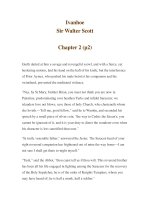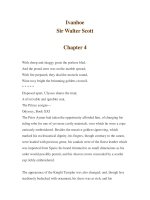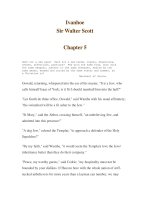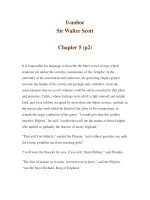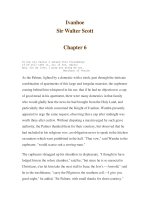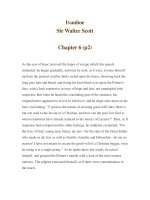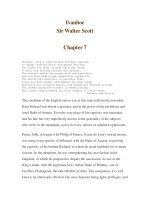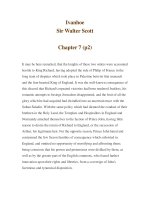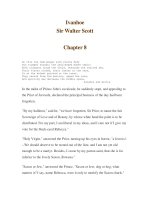Ivanhoe -Sir Walter Scott- Chapter 16 (p2) doc
Bạn đang xem bản rút gọn của tài liệu. Xem và tải ngay bản đầy đủ của tài liệu tại đây (26.05 KB, 10 trang )
Ivanhoe
Sir Walter Scott
Chapter 16 (p2)
They sat down, and gazed with great gravity at each other, each thinking in
his heart that he had seldom seen a stronger or more athletic figure than was
placed opposite to him.
"Reverend hermit," said the knight, after looking long and fixedly at his
host, "were it not to interrupt your devout meditations, I would pray to know
three things of your holiness; first, where I am to put my horse? secondly,
what I can have for supper? thirdly, where I am to take up my couch for
the night?"
"I will reply to you," said the hermit, "with my finger, it being against my
rule to speak by words where signs can answer the purpose." So saying, he
pointed successively to two corners of the hut. "Your stable," said he, "is
there your bed there; and," reaching down a platter with two handfuls of
parched pease upon it from the neighbouring shelf, and placing it upon the
table, he added, "your supper is here."
The knight shrugged his shoulders, and leaving the hut, brought in his horse,
(which in the interim he had fastened to a tree,) unsaddled him with much
attention, and spread upon the steed's weary back his own mantle.
The hermit was apparently somewhat moved to compassion by the anxiety
as well as address which the stranger displayed in tending his horse; for,
muttering something about provender left for the keeper's palfrey, he
dragged out of a recess a bundle of forage, which he spread before the
knight's charger, and immediately afterwards shook down a quantity of dried
fern in the corner which he had assigned for the rider's couch. The knight
returned him thanks for his courtesy; and, this duty done, both resumed their
seats by the table, whereon stood the trencher of pease placed between them.
The hermit, after a long grace, which had once been Latin, but of which
original language few traces remained, excepting here and there the long
rolling termination of some word or phrase, set example to his guest, by
modestly putting into a very large mouth, furnished with teeth which might
have ranked with those of a boar both in sharpness and whiteness, some
three or four dried pease, a miserable grist as it seemed for so large and able
a mill.
The knight, in order to follow so laudable an example, laid aside his helmet,
his corslet, and the greater part of his armour, and showed to the hermit a
head thick-curled with yellow hair, high features, blue eyes, remarkably
bright and sparkling, a mouth well formed, having an upper lip clothed with
mustachoes darker than his hair, and bearing altogether the look of a bold,
daring, and enterprising man, with which his strong form well corresponded.
The hermit, as if wishing to answer to the confidence of his guest, threw
back his cowl, and showed a round bullet head belonging to a man in the
prime of life. His close-shaven crown, surrounded by a circle of stiff curled
black hair, had something the appearance of a parish pinfold begirt by its
high hedge. The features expressed nothing of monastic austerity, or of
ascetic privations; on the contrary, it was a bold bluff countenance, with
broad black eyebrows, a well-turned forehead, and cheeks as round and
vermilion as those of a trumpeter, from which descended a long and curly
black beard. Such a visage, joined to the brawny form of the holy man,
spoke rather of sirloins and haunches, than of pease and pulse. This
incongruity did not escape the guest. After he had with great difficulty
accomplished the mastication of a mouthful of the dried pease, he found it
absolutely necessary to request his pious entertainer to furnish him with
some liquor; who replied to his request by placing before him a large can of
the purest water from the fountain.
"It is from the well of St Dunstan," said he, "in which, betwixt sun and sun,
he baptized five hundred heathen Danes and Britons blessed be his
name!" And applying his black beard to the pitcher, he took a draught much
more moderate in quantity than his encomium seemed to warrant.
"It seems to me, reverend father," said the knight, "that the small morsels
which you eat, together with this holy, but somewhat thin beverage, have
thriven with you marvellously. You appear a man more fit to win the ram at
a wrestling match, or the ring at a bout at quarter-staff, or the bucklers at a
sword-play, than to linger out your time in this desolate wilderness, saying
masses, and living upon parched pease and cold water."
"Sir Knight," answered the hermit, "your thoughts, like those of the ignorant
laity, are according to the flesh. It has pleased Our Lady and my patron saint
to bless the pittance to which I restrain myself, even as the pulse and water
was blessed to the children Shadrach, Meshech, and Abednego, who drank
the same rather than defile themselves with the wine and meats which were
appointed them by the King of the Saracens."
"Holy father," said the knight, "upon whose countenance it hath pleased
Heaven to work such a miracle, permit a sinful layman to crave thy name?"
"Thou mayst call me," answered the hermit, "the Clerk of Copmanhurst, for
so I am termed in these parts They add, it is true, the epithet holy, but I
stand not upon that, as being unworthy of such addition And now, valiant
knight, may I pray ye for the name of my honourable guest?"
"Truly," said the knight, "Holy Clerk of Copmanhurst, men call me in these
parts the Black Knight, many, sir, add to it the epithet of Sluggard,
whereby I am no way ambitious to be distinguished."
The hermit could scarcely forbear from smiling at his guest's reply.
"I see," said he, "Sir Sluggish Knight, that thou art a man of prudence and of
counsel; and moreover, I see that my poor monastic fare likes thee not,
accustomed, perhaps, as thou hast been, to the license of courts and of
camps, and the luxuries of cities; and now I bethink me, Sir Sluggard, that
when the charitable keeper of this forest-walk left those dogs for my
protection, and also those bundles of forage, he left me also some food,
which, being unfit for my use, the very recollection of it had escaped me
amid my more weighty meditations."
"I dare be sworn he did so," said the knight; "I was convinced that there was
better food in the cell, Holy Clerk, since you first doffed your cowl Your
keeper is ever a jovial fellow; and none who beheld thy grinders contending
with these pease, and thy throat flooded with this ungenial element, could
see thee doomed to such horse-provender and horse-beverage," (pointing to
the provisions upon the table,) "and refrain from mending thy cheer. Let us
see the keeper's bounty, therefore, without delay."
The hermit cast a wistful look upon the knight, in which there was a sort of
comic expression of hesitation, as if uncertain how far be should act
prudently in trusting his guest. There was, however, as much of bold
frankness in the knight's countenance as was possible to be expressed by
features. His smile, too, had something in it irresistibly comic, and gave an
assurance of faith and loyalty, with which his host could not refrain from
sympathizing.
After exchanging a mute glance or two, the hermit went to the further side of
the hut, and opened a hutch, which was concealed with great care and some
ingenuity. Out of the recesses of a dark closet, into which this aperture gave
admittance, he brought a large pasty, baked in a pewter platter of unusual
dimensions. This mighty dish he placed before his guest, who, using his
poniard to cut it open, lost no time in making himself acquainted with its
contents.
"How long is it since the good keeper has been here?" said the knight to his
host, after having swallowed several hasty morsels of this reinforcement to
the hermit's good cheer.
"About two months," answered the father hastily.
"By the true Lord," answered the knight, "every thing in your hermitage is
miraculous, Holy Clerk! for I would have been sworn that the fat buck
which furnished this venison had been running on foot within the week."
The hermit was somewhat discountenanced by this observation; and,
moreover, he made but a poor figure while gazing on the diminution of the
pasty, on which his guest was making desperate inroads; a warfare in which
his previous profession of abstinence left him no pretext for joining.
"I have been in Palestine, Sir Clerk," said the knight, stopping short of a
sudden, "and I bethink me it is a custom there that every host who entertains
a guest shall assure him of the wholesomeness of his food, by partaking of it
along with him. Far be it from me to suspect so holy a man of aught
inhospitable; nevertheless I will be highly bound to you would you comply
with this Eastern custom."
"To ease your unnecessary scruples, Sir Knight, I will for once depart from
my rule," replied the hermit. And as there were no forks in those days, his
clutches were instantly in the bowels of the pasty.
The ice of ceremony being once broken, it seemed matter of rivalry between
the guest and the entertainer which should display the best appetite; and
although the former had probably fasted longest, yet the hermit fairly
surpassed him.
"Holy Clerk," said the knight, when his hunger was appeased, "I would gage
my good horse yonder against a zecchin, that that same honest keeper to
whom we are obliged for the venison has left thee a stoup of wine, or a
runlet of canary, or some such trifle, by way of ally to this noble pasty. This
would be a circumstance, doubtless, totally unworthy to dwell in the
memory of so rigid an anchorite; yet, I think, were you to search yonder
crypt once more, you would find that I am right in my conjecture."
The hermit only replied by a grin; and returning to the hutch, he produced a
leathern bottle, which might contain about four quarts. He also brought forth
two large drinking cups, made out of the horn of the urus, and hooped with
silver. Having made this goodly provision for washing down the supper, he
seemed to think no farther ceremonious scruple necessary on his part; but
filling both cups, and saying, in the Saxon fashion, "'Waes hael', Sir
Sluggish Knight!" he emptied his own at a draught.
"'Drink hael', Holy Clerk of Copmanhurst!" answered the warrior, and did
his host reason in a similar brimmer.
"Holy Clerk," said the stranger, after the first cup was thus swallowed, "I
cannot but marvel that a man possessed of such thews and sinews as thine,
and who therewithal shows the talent of so goodly a trencher-man, should
think of abiding by himself in this wilderness. In my judgment, you are fitter
to keep a castle or a fort, eating of the fat and drinking of the strong, than to
live here upon pulse and water, or even upon the charity of the keeper. At
least, were I as thou, I should find myself both disport and plenty out of the
king's deer. There is many a goodly herd in these forests, and a buck will
never be missed that goes to the use of Saint Dunstan's chaplain."
"Sir Sluggish Knight," replied the Clerk, "these are dangerous words, and I
pray you to forbear them. I am true hermit to the king and law, and were I to
spoil my liege's game, I should be sure of the prison, and, an my gown saved
me not, were in some peril of hanging."
"Nevertheless, were I as thou," said the knight, "I would take my walk by
moonlight, when foresters and keepers were warm in bed, and ever and
anon, as I pattered my prayers, I would let fly a shaft among the herds of
dun deer that feed in the glades Resolve me, Holy Clerk, hast thou never
practised such a pastime?"
"Friend Sluggard," answered the hermit, "thou hast seen all that can concern
thee of my housekeeping, and something more than he deserves who takes
up his quarters by violence. Credit me, it is better to enjoy the good which
God sends thee, than to be impertinently curious how it comes. Fill thy cup,
and welcome; and do not, I pray thee, by further impertinent enquiries, put
me to show that thou couldst hardly have made good thy lodging had I been
earnest to oppose thee."
"By my faith," said the knight, "thou makest me more curious than ever!
Thou art the most mysterious hermit I ever met; and I will know more of
thee ere we part. As for thy threats, know, holy man, thou speakest to one
whose trade it is to find out danger wherever it is to be met with."
"Sir Sluggish Knight, I drink to thee," said the hermit; "respecting thy valour
much, but deeming wondrous slightly of thy discretion. If thou wilt take
equal arms with me, I will give thee, in all friendship and brotherly love,
such sufficing penance and complete absolution, that thou shalt not for the
next twelve months sin the sin of excess of curiosity."
The knight pledged him, and desired him to name his weapons.
"There is none," replied the hermit, "from the scissors of Delilah, and the
tenpenny nail of Jael, to the scimitar of Goliath, at which I am not a match
for thee But, if I am to make the election, what sayst thou, good friend, to
these trinkets?"
Thus speaking, he opened another hutch, and took out from it a couple of
broadswords and bucklers, such as were used by the yeomanry of the period.
The knight, who watched his motions, observed that this second place of
concealment was furnished with two or three good long-bows, a cross-bow,
a bundle of bolts for the latter, and half-a-dozen sheaves of arrows for the
former. A harp, and other matters of a very uncanonical appearance, were
also visible when this dark recess was opened.
"I promise thee, brother Clerk," said he, "I will ask thee no more offensive
questions. The contents of that cupboard are an answer to all my enquiries;
and I see a weapon there" (here be stooped and took out the harp) "on which
I would more gladly prove my skill with thee, than at the sword and
buckler."
"I hope, Sir Knight," said the hermit, "thou hast given no good reason for thy
surname of the Sluggard. I do promise thee I suspect thee grievously.
Nevertheless, thou art my guest, and I will not put thy manhood to the proof
without thine own free will. Sit thee down, then, and fill thy cup; let us
drink, sing, and be merry. If thou knowest ever a good lay, thou shalt be
welcome to a nook of pasty at Copmanhurst so long as I serve the chapel of
St Dunstan, which, please God, shall be till I change my grey covering for
one of green turf. But come, fill a flagon, for it will crave some time to tune
the harp; and nought pitches the voice and sharpens the ear like a cup of
wine. For my part, I love to feel the grape at my very finger-ends before they
make the harp-strings tinkle."*
* The Jolly Hermit All readers, however slightly
* acquainted with black letter, must recognise in the Clerk
* of Copmanhurst, Friar Tuck, the buxom Confessor of Robin
* Hood's gang, the Curtal Friar of Fountain's Abbey.

